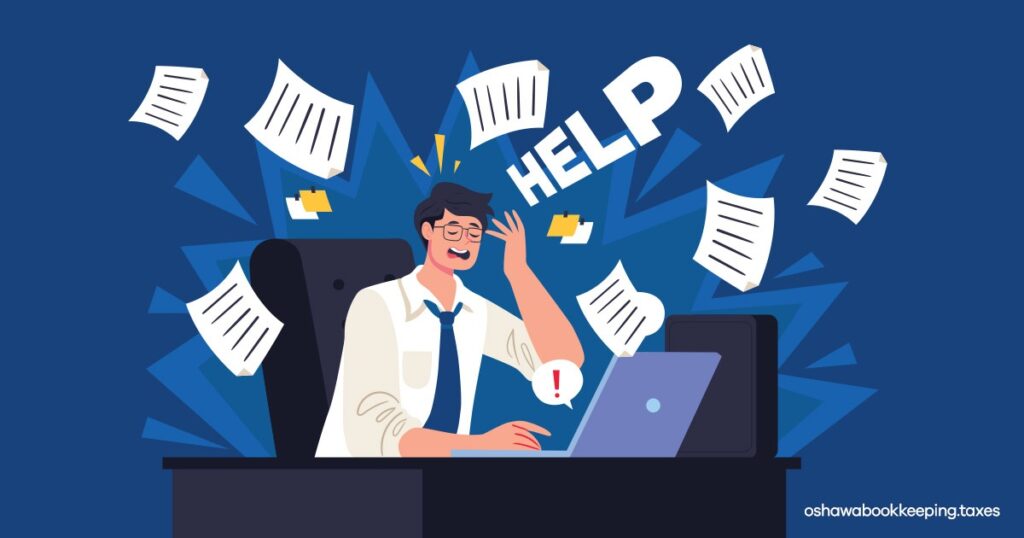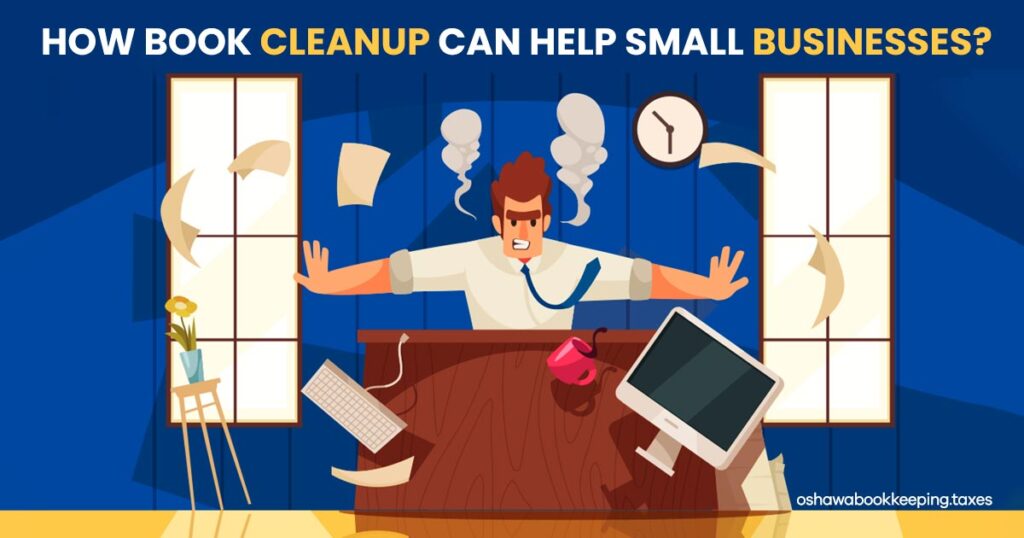- You don’t know the financial status of your business account.
- You barely have any idea about the expenditure of your current business.
- Frightened to log in to your accounting software due to a pile of files scattered?
- Is how much you are spending beyond your mind?
- You’ve got thousands of receipts and invoices here and there smothered in but no trace of entering them?
- Neither do you know if your business is moving toward profit or significant loss?
- Did you leave your monthly reconciliation at a museum that you and your team barely exercised?
- No idea which one is your personal expense and which one is the business expense.
If all the above signs match your current instinct as a small business owner, you are at stake, which means that your book cleanup is scarce. Every business has a clear motive since its inception that it will make a profit by analyzing its monthly to yearly transactions.
When you are busy making a finite yet ample number of transactions per day, having the wrong entry of those transactions into accounting software is inevitable, especially when you leave them for the last minute. This is where most owners make mistakes.
When a new year begins with new hopes and financial forecasting, you will be at a precipice in cleaning up your book of the last year, which you didn’t bother to partake in. Now, when it is time for tax audit and budget planning, you are pulling your hair worrying about why you didn’t execute your book cleanup for a small business.
But it’s too late, and any late lesson you were about to learn from your past year’s mistakes to get a grip on your financial reporting and profit and loss analysis is finally over. It means you are going to make the wrong attempt, improper payment, and inaccurate calculation for your new year’s cash flow management.
Hence, read this blog to know how a book cleanup can help small businesses at a distressing time and recover their budget to lead a sustainable economy.
What Is Book Cleanup?
Book cleanup is a process in accounting that initiates reviewing and reconciling all the financial records into a proper record-keeping system so that the business’ receivable and payable accounts remain up to date.
This process involves –
- Reviewing the financial transactions that occur regularly and intermittently
- Finding any errors in those records, such as errors occurring during entry, double entry of the same transaction, wrong categorization, etc.
- Reconciling the small business’ main accounts and their other financial statements, including bank statements, credit account statements, loan statements, etc.
- Cleaning up all those errors and discrepancies happening, be it wrong entry into the ledger account, wrong journal entry, any instant and big cash transfer, etc.
With a combined effort, including correction and proper alignment, you can revise those transactional records and sort them through to organize them in the right shape so the bookkeeper or accountant can estimate your business expenses and income.
This, in turn, helps you get a perspective of your current financial year and predict what the turnover might be in the next year if the records are done and organized in an effective manner on time without leaving them messier.
The Importance of Book Cleanup for a Small Business
Small businesses are fraught with many significant and minuscule levels of problems. One of the major problems attributing to a messy cleaning up of the book is piling them up without taking care of them at the right time. Many owners think this is an easy task, and it’s all about taking income as profit and any overdue as a loss. But that doesn’t represent the proper health of your finance.
You need to have sufficient transaction-related information present, so you know what decisions to be taken to run your company further. For example, if you want to buy equipment for your business from an account where the money amount seems big, but you already owe a substantial amount to another supplier, you will be in trouble.
You may not realize it because your invoices for paying the current vendor are missing or haven’t been sorted in the account book. In addition, if you pledge to buy equipment from a new vendor, you won’t be able to pay the current one because your existing amount will wither away by that time.
By then, you’ll lose the trust of your vendors, and crises will loom up, indicating that your business cannot linger on unless its assets are increased.
Now, if you don’t catch up with these problems time-to-time to the previous year, you might make the same mistake that will drive your business economy up the wall. Scrutinizing and conducting a solid audit will help you obtain a proper report of your previous years’ blunders and thus enable you to prepare better financial statements that formulate a better financial recovery.

Embarrassment gets just an inch far from putting you in victim play once CRA tends to audit you if they don’t get all the paperwork related to your transactions. They already assume you haven’t been alerted to tax compliance due to your messy books and inaccurate bookkeeping method. Thus, it leads to a huge penalty incurred by the authority and may lead to a permanent business shutdown.
How Book Cleanup Can Help Small Businesses?
Review Your Books Monthly
When you put your book cleanup on the back burner, a huge pile of statements will stack up that will take ages to solve. Once the transactions start to happen in your company, you must cleanup them instantly.
Once all your transactions are recorded and kept in a digital format, try to evaluate them and find out if those transactions get any faulty transactions, mussing figures or abnormal transactions that you might not be aware of.
Also, any errors or large gaps must be addressed immediately; otherwise, you will forget them over a period of time, resulting in not remembering them at the end of the year during a forecast.

It’s a long work when you leave it toward the end, but if you divide it up and assign someone just from the beginning to do them every day on a monthly basis, no matter if the person has to do only pint-sized cleaning up of the account around 15 minutes each day, it will spare you hundreds of hours pain at the end, helping you focus on other managerial tasks of the business.
Since accounting may not be your task or subject, a professional accountant like Oshawa Bookkeeping can help you evaluate your current statement based on your current cash flow management, such as balance sheets, profit statements, loss statements, and revenue generation.
They can help you get an overall idea of your company’s financial health so that you can solely make a decision for the next year’s projection with the help of the right advice given by Oshawa bookkeepers.
Keep Records of All Business Transactions
You must be able to create parity and offset between the accounts payable management and account receivable management to ensure that all your accounts-related info is updated. At the time of urgency, you can get it supplied from your accountant or bookkeeper to share with your stakeholders or investors to give them a clear picture of your turnover to gross and net profit.
It also instills an idea in your mind about how much you owe to a company and how much a company owes to you. Fair to say – your receivable account that will have the deposited amount must be reviewed properly to check that the money has been transferred to your account that your clients were supposed to pay. You can do this by monitoring the bookkeeping software and amending anything that seems suspicious.
On the other hand, the payable account should be monitored thoroughly because this shows how much you are yet to pay your vendor for taking or purchasing their services. Anything that starts with recurring payments, such as mortgage-due installments, utility bills, car insurance, and vendor bills, must reflect on the balance sheet and accounts payable. And both balance and accounts payable must match the company’s financial record.
When a company purchases any goods from a vendor, it doesn’t pay them instantly but rather at a fixed date that is kept as an invoice in a payable amount. Payable amount refers to an account that contains information like the owed amount to the suppliers, the date of purchase, the amount due and any discount added.
Besides, the balance sheet exposes various critical information like how much the company owns right now through assets, how much has been invested through equity and what amount the vendor will receive via liabilities.
By keeping all of them up to date using the book cleanup method, you can now create a consolidated financial statement to generate a proper income statement.
Regularly Reconcile Your Accounts
The reconciliation process involves matching the bank and credit account statements against the transaction records made into the bookkeeping software. This ensures that any discrepancies or unidentified transactions are revealed and then sorted as soon as they are exposed. When you see one amount in your record book but another in your statement (more or less), that will worry you a lot, right?
That’s why the sooner you reconcile, the quicker you should print them for hard copies, besides entering them into your system for instant audit and filing to save your back. You can also compare your loan and credit statements against the main account of your business. A loan statement is generally issued by the lender stating all the loans attributed to the company, such as how, when, and why the principal and interest payments are recorded in the business’s accounting system.
The credit issuer generates the credit statement, highlighting the record-keeping of your payment and purchases. Any bad debt – the debt that your client was to pay you, but now there is no chance of getting it paid back – is also identified when comparing the statements and your account’s bookkeeping.
That’s why not regularly reconciling your account is one of the biggest mistakes in bookkeeping that might otherwise bring out lots of unnoticeable errors. Having found them, you can easily streamline your business’s financial structure and move on with a new structure to better forecast the next year’s projection. Your accountant can help you with that by reviewing the chart of accounts.
Use Accounting Software
Manually calculating your complex accounting and generating financial reports could take a heavy toll on you due to human error, wrong entry and inability to calculate quicker and that too perfectly. Besides, reconciling your accounts and recording all the transactions manually involves a lot of tasks for a person to do at once, as most small companies don’t tend to emphasize the book cleanup process enough.

If you want to execute all of the above activities spontaneously, you need the help of accounting automation tools. Most of these tools are cloud-based, meaning you can access them and use them from anywhere. Besides, when you need to close your previous year’s book, you can do so while protecting its privacy and any unexpected breach and backing them up when needed.
With such tools, you can also find any transactional-related information in your grip when the CRA tends to audit and raid. Since all the documents are stored inside the software, they are less likely to get lost and always remain organized, which CRA likes to see being put in place.
Earlier, we talked about bad debt, and the interesting thing is that most of these tools are equipped with a function that can write off those debts via the Credit Memo option.
Consider Hiring a Professional Accounting Service
The most important of all is to seek and hire a professional accountant or bookkeeper to manage and tackle all your indispensable accounting jobs. Most small businesses think it’s an extra burden, and their self-employed employees without no prior knowledge in accounting, particularly in bookkeeping, can supervise it, but their lack of expertise makes it even double jeopardy.
Please admit that you are not a guru in accounting and don’t have to just because you do business. But try to get a helping hand from a dedicated in-house bookkeeper who can solve your problem in just the blink of an eye because they specialize in accounting, software integration, software handling, statement evaluation and interpretation of visual data.
Hiring them in the first place may seem extravagant, but that will give you long-term relief, sparing you precious time and money and giving you value for everything. You will know someone is on your back to save you from the penalty and foul play.
What’s Next?
Oshawa Bookkeeping has some of the best Canadian accountants and bookkeepers for book cleanup for a small business. You may have approached some accounting companies already to gear up your book cleanup process, but they might either be too expensive or don’t do everything related to bookkeeping.
But Oshawa has a 360-degree solution, which deals with full-cycle bookkeeping, year-end records, CRA communications, pay slips & T4 generation and GST, PST and HST filing. Again, we can’t stress enough how important and urgent it is for you to clean your book to improve your financial management and planning for a successful financial year to come.

